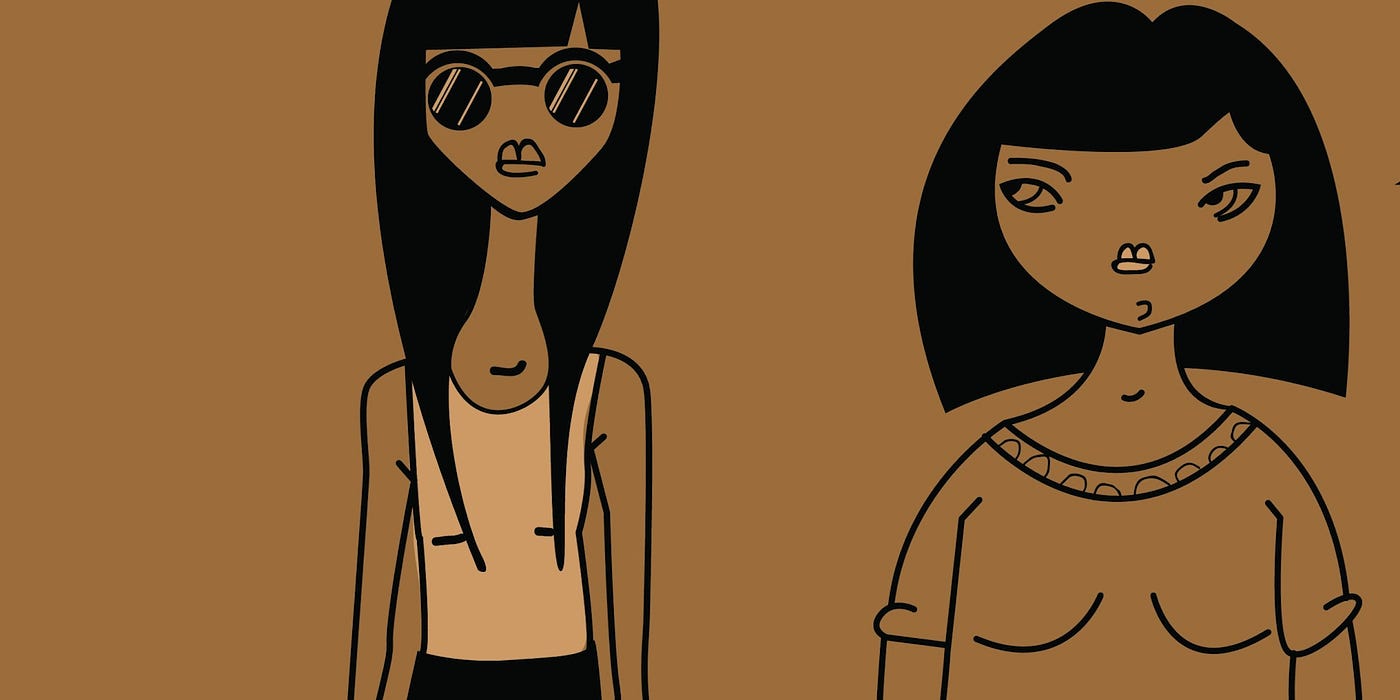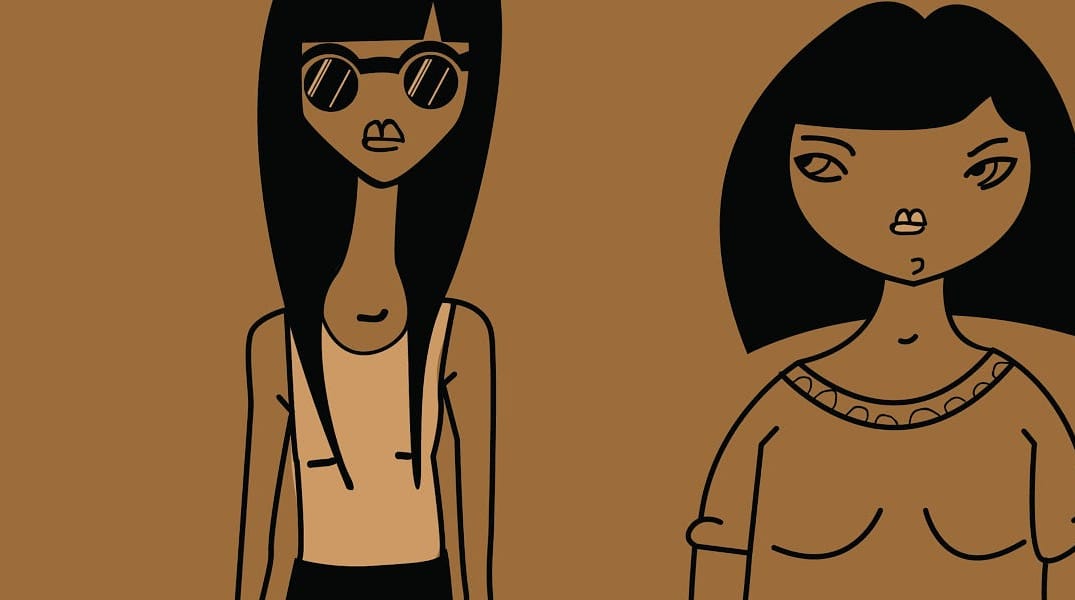
When BuzzFeed recently sourced questions for its “Ask An Asian” video on Facebook, more than 7,000 responses came in. One of the comments was “Are there any fat Asian people? I’ve never seen one.” I wanted to write in response that there are fat Asians, but you probably don’t think we’re that fat.
I’m a fat Asian girl. When I told a male Caucasian friend I was writing about how fat I am, he laughed. “You know you’re not fat.” I’m not fat to Americans.
A quick Internet search for “hot Asian women” revealed this delightful article: “42 Seriously Hot Asian Women to Get You Through Monday” (you’re welcome). This photo slideshow reveals exactly what pop culture seems to think about Asian women and our bodies. We all have tiny size-two waists, slender legs, and perfectly straight hair. We’re always trying to take off our clothes. And when we sweat, we still look sexy.
Although every woman is subjected to these same stupid standards of impossibly skinny waists, busty boobs, and twig-type arms, in Asian American culture, losing weight and being skinny is tantamount to getting good grades. First-generation Asian parents are just as proud of us when we graduate from a top university as when we shed serious pounds. At five feet tall, my large runner-type calves, stocky frame, and size-eight waist are equivalent to getting an F-minus on a calculus final (which I did).
I love my Taiwanese heritage, but at any family gathering, conversations often revolve around who has gained weight and who has lost weight. So-and-so used to be so cute as a kid, but now they’ve really gained a lot of weight. Or can you believe so-and-so lost so much weight? They look so good now!
Out of all the women in my family, I’m the only one with a size D bosom — a fact that is frequently pointed out by female cousins, my mom, and my aunts. I was so embarrassed by my big boobs that I used to wear two bras and two T-shirts in seventh grade to hide them. Never mind the fact that most of the girls in my class hadn’t even developed yet.
I love my Taiwanese heritage, but at any family gathering, conversations often revolve around who has gained weight and who has lost weight. So-and-so used to be so cute as a kid, but now they’ve really gained a lot of weight. Or can you believe so-and-so lost so much weight? They look so good now!
As a teenager, I tried diet pills, eating only oranges for breakfast, and joining the tennis team to try to morph my body into size-two Gap jeans, which never happened. At my heaviest, I was 160 pounds. I have a photo from that time period that my mother, whom I love dearly, told me to never look like again. Ever. My father once took me to a doctor’s office to inquire about plastic surgery because he deemed my thick lips equivalent to “pig’s lips.” Plastic surgery is common in South Korea and Taiwan as a way to fix women’s faces and bodies. Liposuction, nose jobs, calf-reduction surgery, and double-eyelid surgery are popular ways to conform to more “pleasing” Western features.
Weight and appearance is not a taboo subject for people to talk about in Chinese culture. Case in point: her older cousin recently gave her weight-loss tea and a Fitbit, saying, “I thought you could use these.” Whenever her relatives in China want to buy her clothing, Jessica’s mother tells them she is a men’s size XL. (She is actually a size 10.)
The feminist in me wants to be stronger than these standards, get over these doubts, and be happy with my body. The teenager in me just wants to fit into skinny jeans and have a permanent Japanese hair-straightening treatment.
I’m not alone in experiencing the fat- and body-shaming tactics that my family uses. My friend Jessica, who spent part of her childhood living in China, says, “Weight and appearance is not a taboo subject for people to talk about in Chinese culture. It’s so normalized to talk with zero tact about it.” Case in point: her older cousin recently gave her weight-loss tea and a Fitbit, saying, “I thought you could use these.” Whenever her relatives in China want to buy her clothing, Jessica’s mother tells them she is a men’s size XL. (She is actually a size 10.) But for Jessica, the pressure to conform doesn’t bother her. “When I was a kid, I was a total tomboy and really wanted to be big and strong. However, I know that tons of Chinese American women have body/weight issues because of how pervasive the skinny thing is in Chinese culture.”
When I asked Rose, my Filipino American best friend, for stories about family members commenting on her weight, her response was, “I have a ton.” Says Rose, “My dad’s sisters are obsessed with my weight. They always feel the need to tell me when I’m bigger, like ‘Oh, you’ve gained weight.’” Despite the fact that we’re both in our mid-30s, she says, “When I’m around my family, I feel like I descend into my teenage, insecure self again.”
Don’t get me wrong. Our immigrant parents instilled a strong work ethic in us, paid for us to go to college, and wanted us to do better than they did. But to most of them, body shaming isn’t a thing. It’s a fancy American phrase for what sad, fat girls go through.
My college roommate, Grace, who is Korean American, told me that her worst experience was during a Christmas dinner at her cousin’s house as a teenager. Her cousin bought her a pair of pants, which Grace tried on. In front of everyone, her mother stuck her hands down Grace’s pants and said, “They are too tight on you!” Since sixth grade, Grace’s mother has bugged her to get blepharoplasty, commonly known as the procedure that turns typical Asian monolid eyes into more Americanized double eyelids. Before her wedding day, Grace’s mom offered to send her to Korea and pay for the double-eyelid surgery. Grace refused. The first thing Grace’s mother asked after Grace delivered her first child was “Does she have double eyelids?”
Don’t get me wrong. Our immigrant parents sacrificed a lot for us to come to America. They instilled a strong work ethic in us, paid for us to go to college, and wanted us to do better than they did. But to most of them, body shaming isn’t a thing. It’s a fancy American phrase for what sad, fat girls go through. They are simply telling us the truth.
When I confronted my own mother recently that I hated that “Never look like that again” comment, she confessed that she didn’t remember saying that to me. Tearfully, she told me that she loves me, no matter what. I believe that she does. Our conversation wasn’t an easy one, but I told my mother that I wish she’d say nice things about how I look instead of always commenting on my weight. Our talk didn’t suddenly wash away the years of hurt and criticism, but it felt like a small change in the right direction.
While it’s easy to blame our parents and our culture, we’re not teenagers anymore. Yes, we feel insecure sometimes. Sometimes we do feel fat. But my friends and I are smart and talented women who are raising a new generation of Asian girls whom we won’t pressure into having plastic surgery or becoming stick-skinny. We understand that the change begins with us in acknowledging that “all women have imperfect bodies in their late 30s,” as Grace puts it. Or knowing that our parents’ negative comments are just a bunch of nonsensical talk. We’ll never be towering size-two supermodels, but we don’t want to be.
So, yes, I’m a fat Asian girl. But I’m so much more than that.
Image from Thinkstock







